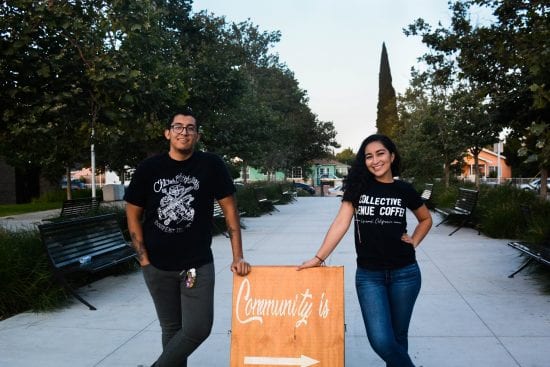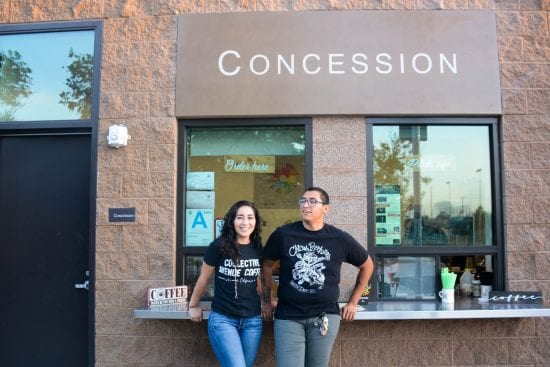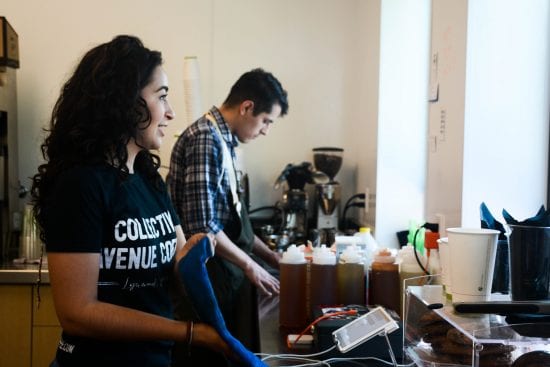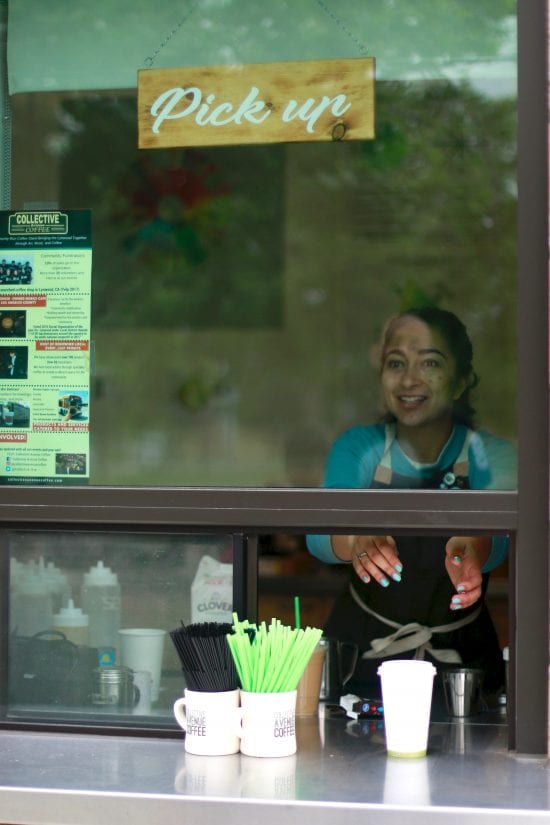
Collective Avenue Coffee started as a pop-up in southeast Los Angeles; now it’s a brick-and-mortar space that encourages entrepreneurship and community investment.
BY RJ JOSEPH
SPECIAL TO BARISTA MAGAZINE
Photos courtesy of Collective Avenue Coffee
In this series, we highlight cooperatively run coffee shops and explore the details of what makes co-ops tick. To learn more about the co-op model, read our feature in the the October + November 2018 issue of Barista Magazine.
Since 2015, Collective Avenue Coffee has been uniting its community in Lynnwood, Calif., around the spirit of investment and entrepreneurship using the co-op model. I talked to worker-owners Kateri Gutierrez and Jonathan Robles about why they started Collective Avenue, how it works, and what the future holds.

Mission
Kateri and Jonathan joined forces almost four years ago with the goal of using a coffee co-op as a way to invest in their community and vice-versa. “We’re a low-income community in southeast L.A. Whereas in other places you might have investors putting in money, the most approachable way for our community to invest in a business and gain ownership is by putting in labor. That’s why we started a co-op; we see a big need for entrepreneurship in our community. We want to teach people not to just be an employee for life but to actually own a business and lead.”
Structure
Currently, Kateri and Jonathan are the only two worker-owners. In terms of labor, they see a lot of volunteership from their community. Some volunteers just see work to be done and want to help, others are interns apprenticing specific skills, and some are workers investing labor toward worker-ownership. Like other co-ops, Collective Avenue is one-member one-vote, but because there are currently only two worker-owners, that system works without a whole lot of complexity.

Having recently opened their first brick-and-mortar location after over two years as a popup, Kateri and Jonathan are seeing growth and working toward a second location that will allow them to create even more opportunity. “The city saw how much of an impact we were having on young adults and they invited us to rent this spot out and collaborate on a more permanent level. We’re now much more sustainable because people know where to find us. We see the space as a canvas our community can paint on,” says Kateri.
Finances
One of the challenges of starting a co-op is that, since a co-op by definition must be operated by workers, most co-ops can’t take on traditional investment funds. In the case of Collective Ave, Kateri and Jonathan went two years working other jobs full-time and reinvesting funds back into the business rather than taking salary. Having started the business at 23 knowing they wouldn’t be able to get a small business loan, they crowd-funded their espresso machine. Now, as the business grows and gains more resources, they continue to reinvest resources into the business and community, allocating tips to scholarship programs and taking on more interns every summer.

Challenges
While running a co-op is rewarding, it comes with major challenges. One of the biggest ones for Kateri and Jonathan was finances, both within the business and outside it.
“There have definitely been a lot of ups and downs, even just around staying open,” says Kateri. “There were times when there was no money coming in but we couldn’t give up on the business because we knew a lot of people were relying on it and wanting to become part of it. There were times when I almost went homeless. But even if it’s caused ups and downs in our own personal security, we see it a long-term investment in our community. We don’t have a lot of avenues in our community for making change; Collective Avenue was never just for us, it’s for our community.”
Because of worker-owners’ deep personal investment, work-life balance can also be a struggle. “It was hard to strike a balance of putting in the extra hours and also being with our families,” says Kateri. “We don’t have parents who can lend us money. A lot of it was being willing to learn and put in our hours because that’s really all we had was our labor and our social capital and our bodies.”

Motivators
Despite those struggles, Kateri and Jonathan have stayed motivated by their role in their community. “We talk about it as ‘lift as you climb.’ You have to make sure your community is learning alongside you. We were open with our community about the struggles we faced, because that’s part of entrepreneurship,” says Kateri. “There are a lot of struggles, but we don’t take for granted that in the middle of the struggles, we had a whole community. During our grand opening, we had whole families join in and start helping. We had students come up to us and tell us they are starting their own businesses, inspired by us. Entrepreneurship is contagious and Collective Avenue helps people get that spark. People may say that the system is bound to make us fail; we want to show that with persistence and love you can truly build something sustainable.”
 ABOUT THE AUTHOR
ABOUT THE AUTHOR
RJ Joseph roasts coffee and writes a blog called Queer Cup in addition to her other adventures in coffee journalism. Her writing focuses primarily on equity, workers’ rights, and alternatives to the status quo. In her free time she loves cooking, reading, and being in Oakland, Calif. You can follow her on Instagram and Twitter.

